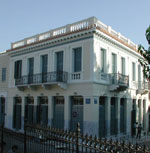
Dora Bakoyannis, Mayor of Athens and winner of the 2005 World Mayor Award

FRONT PAGE
About us

The 2010 results
The 2010 project
The 2010 finalists
Code of Ethics
The World Mayor Prize

The 2008 results
The 2008 project
The 2008 finalists
The World Mayor Award

The 2006 results
Methodology
The 2006 finalists
The World Mayor Award

The 2005 results
Contest methodology
List of finalists
The World Mayor Award
Mayor Rama writes - Mayor Bakoyannis replies
Winning mayors write

Mayor of Athens
Mayor of Guatemala City
Mayor of Mississauga
Mayor of San Fernando
Mayor of San Francisco

Mayor of Athens
Mayor of Guatemala City
Mayor of Mississauga
Mayor of San Fernando
Mayor of Vienna

Comments on finalists from The Americas
Comments on finalists from Europe
Comments on finalists from Asia, Australia and Africa
Mayor of Addis Ababa
Mayor of Antananariva
Mayor of Athens
Mayor of Atlanta
Mayor of Belo Horizonte
Mayor of Bonn
Mayor of Guatemala City
Mayor of Karachi
Mayor of London
Mayor of Melbourne
Mayor of Mississauga
Mayor of Rio de Janeiro
Mayor of Rome
Mayor of San Fernando
Mayor of San Francisco
Mayor of Toronto
Mayor of Vancouver
Mayor of Vienna

Mayor of Addis Ababa
Mayor of Antananarivo
Mayor of Athens
Mayor of Belo Horizonte
Mayor of Bonn
Mayor of Ekaterinburg
Mayor of Guatemala City
Mayor of Innsbruck
Mayor of Karachi
Mayor of Kiev
Mayor of Melbourne
Mayor of Mississauga
Mayor of Munich
Mayor of Rhodes
Mayor of Rome
Mayor of Tshwane
Mayor of Vienna

The 2004 contest
List of all 2004 finalists
Edi Rama wins 2004 award
People ask - Edi Rama replies
Why we voted for the Mayor of Tirana
Why we voted for the Mayor of Mexico City
History of Tirana

Front Page
Site Search
About us
Dora Bakoyannis
Mayor of Athens, Greece
By Andrew Stevens, Political Editor
Athens is said to be the ‘cradle of democracy’ by virtue of the city state which governed during the time of Aristotle, though women and slaves during that era might have disagreed with the description. Today’s Greek capital is in fact governed by a female mayor whose deceptive appearance closer resembles an actress or television presenter than a politician. Mayor Bakoyannis was elected as mayor of Athens in October 2002 with the largest majority in the city’s history. In 2005, Dora Bakoyannis won the World Mayor Award. In February 2006, she was appointed Greece's first female foreign minister.
Born in 1954 as Dora Mitsotakis, eldest child of Constantine Mitsotakis who later went on to be Greece’s prime minister in the early 1990s, she studied politics at the University of Athens and in Munich, Germany. During the period of military dictatorship under the regime of The Colonels which lasted between 1967 and 1974, the family lived in exile in Paris. They returned in 1974 and Dora was married to Pavlos Bakoyannis, a politician. She then embarked on a career as a civil servant and worked in several government ministries.
In 1984, her father Constantine Mitsotakis became leader of Greece’s centre right party New Democracy and she was appointed his head of staff. New Democracy had played an important role in the transition from the period of military dictatorship, winning the first free elections in 1974 under the leadership of Constantine Caramanlis, who had served as Prime Minister during Greece’s post-war period under the former monarchy, between 1955 and 1963. Caramanlis’ New Democracy-led government phased out the last remnants of dictatorship and took Greece into the European Economic Community.
Mitsotakis himself was from one of Greece’s main political dynasties, his father and grandfathers were members of parliament and his uncle was Eleftherios Venizelos, leader of the old Liberal Party and prime minister in several governments during the first half of the 20th century. Mitsotakis began his career in the Centre Union party of George Papandreou but resigned in 1965 in order to bring about the end of the Papandreou government, which was destabilised by both the monarchy and the military. After failing to be elected in 1974, he succeeded in 1977 and served as economic co-ordination minister and then foreign affairs minister in the New Democracy government of Caramanlis, which was defeated in the 1981 election by the Pan-Hellenic Socialist Movement (PASOK) of Andreas Papandreou, son of former prime minister George. Mitsotakis and Papandreou dominated Greek politics in the 1980s, with Mitsotakis leading the first New Democracy government for a decade in 1990.
The Mitsotakis premiership saw Dora Bakoyannis appointed as a junior minister then minister of culture. In 1989 however, the November 17 terrorist organisation assassinated her husband Pavlos, a New Democracy parliamentarian. November 17 took their name from a student uprising of 1973 against the military dictatorship and operated in a similar manner to other European revolutionary cells such as Germany’s Red Army Fraction and Italy’s Red Brigades. In 2003, her husband’s assassins were convicted of a number of political murders that took place over the last decade and a half, including the murder of a British diplomat in 2000.
The Mitsotakis government pursued a more Atlanticist foreign policy than its PASOK predecessor and liberalised the Greek economy, privatising state enterprises and reforming the civil service. Mitsotakis lost the Greek general election and the leadership of New Democracy in 1993 with Costas Caramanlis, nephew of former prime minister and party founder Constantine, assuming the post in 1997. In 2000 Caramanlis appointed Bakoyannis as the party’s foreign affairs spokesperson and picked her to fight the Athens mayoral election in 2002. Having asserted itself in the local elections and taken the city, New Democracy returned to power on the national stage in 2002, with Costas Caramanlis becoming the youngest prime minister in Greek history.
Bakoyannis had the advantage of the city already being chosen in 1997 to host the 2004 Olympic games when she entered office in January 2003. She presides over a capital beset by a number of environmental problems, with rapid growth seeing 45% of the Greek population resident in the metropolitan area around the city. Massive investment has eased some of the transportation issues, with the Athens Metro being one of the best in the world. The capital is governed by 54 separate municipalities, each with an elected council and mayor. Mayor Bakoyanis is head of the largest municipality in metropolitan Athens, which has 900,000 residents to its name.
The mayor’s telegenity and manner are side issues, though she frequently tops polls as the most popular politician in Greece. She has also gone beyond the Olympic legacy and used her vision to transform the city and make tangible changes to benefit its residents, with plaudits from supporters and opponents alike. In 2003, she was chosen by Italian socialist politician and then European Commission president Romano Prodi to serve on his commission on sustainability.
The mayor relies on her slogan, “I will do my best”. Bakoyannis is spoken of as a future party leader, apt given her dynastic credentials. She married for the second time in 1998, to businessman Isidorous Kouvelous, and has two children from her first marriage.

Since Mayor Bakoyannis' election, some 2,300 neo-classical building facades have been restored in Athens
A brief history of
Modern Athens
By Maria Paravantes
Briefly outlining the history of Modern Athens is no simple task. Athens, first settled around 4500 to 4000 BC in the area around the Acropolis, holds - rightfully so - the title of the oldest continuously inhabited city in Europe. The city got its name from Athena, the maiden goddess of wisdom, reason and truth.
Its modern history extends roughly from the fifteenth and seventeenth centuries – but more specifically from 1834, when Athens was declared capital of Greece, in place of the Peloponnesian town of Nafplion.
The history of Athens is profoundly marked. In its glorious past, it has suffered and withstood. While the rest of Europe was being Enlightened, Athens was being hushed. Four-hundred years of Ottoman occupation (1456), monarchy and dictatorships, political crises, the Balkan (1912-13) and Civil (1946-49) wars, a massive migrant influx (1922), the Nazi invasion (1941) and famine (1941-42), are some of the “ingredients” that make up modern Athens.
In its time, the Acropolis and the Parthenon (dedicated to Athena), the eternal symbol of democracy and freedom, has been invaded, ravaged, looted and used as a warehouse, but it has also served as a breeding ground for resistance and independence. Today, some 2,500 years on, it still stands proudly overlooking the city. It continues to inspire the world, sending out the message of peace and democratic ideals, which form the very basis of the Western world’s identity and cultural heritage.
The modern Greek state was founded in 1830, marking the end of Ottoman occupation and the beginning of a new era for Athens. The first municipal elections were held in 1835 and the foundation stone for City Hall was laid in 1872.
Milestones in the history of modern Athens include the opening of the University of Athens in 1837 and the foundation of the National Bank of Greece in 1841. The year 1844 saw the voting on the Constitution, and in 1876 Athens got its own stock exchange.
The Athens-Piraeus railway was established in 1882. One of the city’s oldest hospitals, Evangelismos, opened in 1884. In 1894, Athenians held their first Labour Day march. And in 1896, the first modern Olympics were held in the City of Athena. In the 1900s Athens got electricity. One of the city’s most-loved sights, the power-driven tramcar, made its way into the Greek capital in 1908. That’s also when the first telephone rang in the Greek capital. Athens went on the air in 1926.
The 1922 Asia Minor catastrophe changed the urban landscape of Athens, with over one million refugees fleeing to Greek shores. With them, the refugees brought their traditions, adding their own cultures to the mosaic we call Athens today.
Greece joined NATO in 1952 and 1981 became a member state of the European Union. Twenty-three years later, the international spotlight was once again cast on Athens as host city for the 2004 Olympic Games, the first Games to follow the tragic 9/11 and Madrid events. An impressive total of over 3.2 million tickets were sold.
Athens today is a vibrant metropolis and is home to a multi-cultural population of approximately four million (suburbs included). The City of Athens, headed by its first female mayor, Dora Bakoyannis, is divided into seven municipal districts.
A city whose modern history is as resonant as its ancient past, the Greek capital offers visitors the opportunity of experiencing what they read about in books.
After all, treading the same path that Socrates once walked some 2,400 years ago is no small matter. That is why modern Athenians have a very different understanding of time and urgency.
Living in a city that breathes history can only make you view time in a very different light - the Athenian light!
